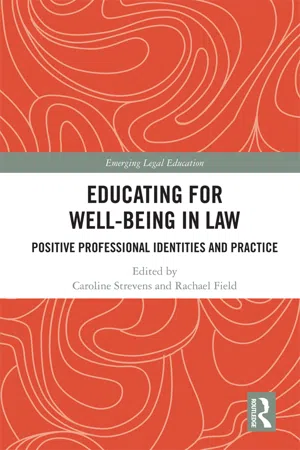
Educating for Well-Being in Law
Positive Professional Identities and Practice
- 194 pages
- English
- ePUB (mobile friendly)
- Available on iOS & Android
Educating for Well-Being in Law
Positive Professional Identities and Practice
About This Book
Bringing together the current international body of knowledge on key issues for educating for well-being in law, this book offers comparative perspectives across jurisdictions, and utilises a range of theoretical lenses (including socio-legal, psychological and ethical theories) in analysing well-being and legal education in law. The chapters include innovative and tested research methodologies and strategies for educating for well-being. Asking and answering the question as to whether law is special in terms of producing psychological distress in law students, law teachers and the profession, and bringing together common and opposing perspectives, this book also seeks to highlight excellent practice in promoting a positive professional identity at law school and beyond resulting in an original contribution to knowledge, and new discourses of analysis.
Frequently asked questions
1 The ethics of well-being
Psychological health as the vanguard for sociological change
Introduction
Table of contents
- Cover
- Half Title
- Series
- Title
- Copyright
- Contents
- List of contributors
- Preface
- Acknowledgements
- 1 The ethics of well-being: Psychological health as the vanguard for sociological change
- 2 Self-care as a professional virtue for lawyers
- 3 Values: The flip side of the well-being coin
- 4 Well-being and a positive professional identity in the legal profession: A snapshot of the UK Bar
- 5 Determined to be professional, ethical and well
- 6 The information gap: A comparative study of the paradigms shaping perceptions of career success for law undergraduates and professional legal training students in Australia and the latent implications of non-professional legal career opportunities for law graduates in England
- 7 Widening the approach to ethics teaching and positively affecting the ethical professional identity of trainee solicitors in Ireland
- 8 Connectivity, socialisation and identity formation: Exploring mental well-being in online distance learning law students
- 9 Which hat shall I wear today? Exploring the professional and ethical implications of law clinic supervision
- 10 Clinical legal education and the hidden curriculum in the neoliberal university in England and Wales
- 11 Resilience, positive motivation and professional identity: The experience of law clinic students working with real clients
- 12 Meditation in legal education: The value added toward the well-being of law students
- 13 Identity, well-being and law students
- Index